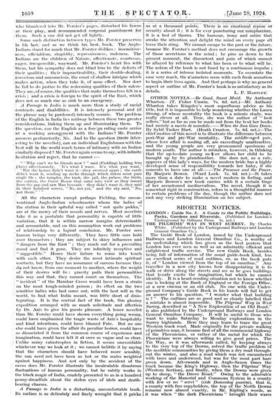OTHER NOVELS. Be Good, Sweet Maid. By Anthony Wharton. -
-(T. Fisher Unwin. - 7s. 6d. net.)—Mr; Anthony Wharton takes Kingsley's most superfluous advice as his title, but it is impossible to help wondering whether the Laura Strong, of whose mentality the book is a minute study, was really clever at all. True, she was the author of best sellers," but as far as can be made out from the text her books had merely- a succes de scar-dale. When the Sun Goes D_ own. By Sybil Tasker Hart. (Heath Cranton. 7s. 6d. net.)—The chief motive of this novel is to illustrate the difference between post-War and. pre-War mentality. The middle-aged pair, whose love affair is cooling off, are exceedingly unattractive, and the young people are very pronounced specimens of modern youth. The author is mistaken, however, in thinking that the up-to-date young metier allows her child to be brought up by its grandmother. She does not, as a rule, approve of this lady's wayi, for the modern bride has a highly developed sense of responsibility towards her baby, if she consents to have 'one at all. _ ' The Presence and the Power. By Marjorie BoWen. (Ward.. Lock. 7s. 6d. net.)—It takes more than a date to make a novel modern in feeling, and Marjorie Bowen's new book carries with it a -certain tinge of her accustomed mediaevalism. The novel, though it is somewhat rigid in construction, refers in a thoughtful manner to certain problems of the day, though the author does not cast any very striking illumination on her subject.














































 Previous page
Previous page